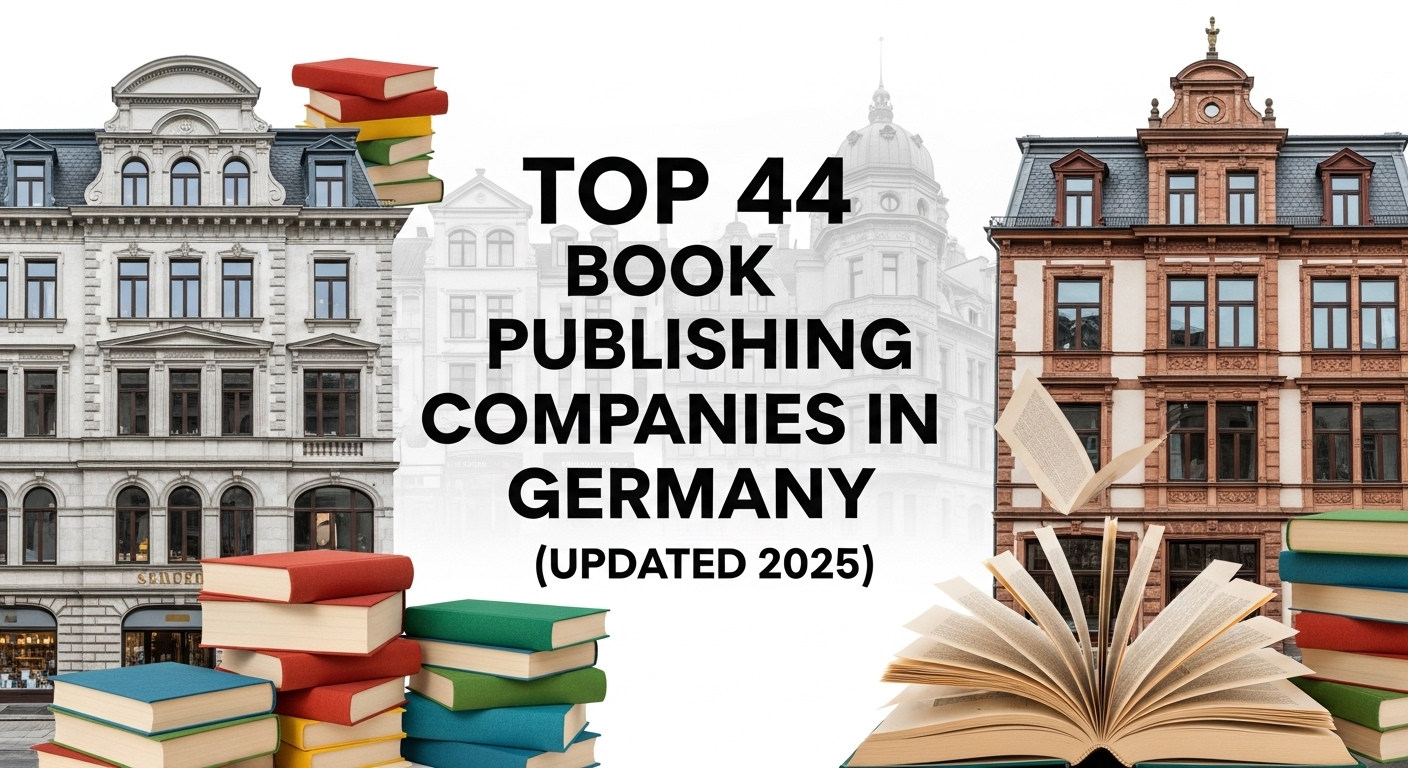
Germany’s publishing industry is one of the largest and most influential in the world, known for its deep literary heritage, cutting-edge innovations, and strong presence at events like the Frankfurt Book Fair. With a thriving mix of independent presses, academic publishers, and major trade houses, authors can find opportunities across every genre—from literary fiction and children’s books to technical manuals and translated works.
Below is an updated 2025 guide to the top 44 book publishing companies in Germany, featuring a variety of publishers and service providers that play a significant role in helping writers bring their manuscripts to market.
1. Barnett Ghostwriting
Though not a publisher in the strict sense, Barnett Ghostwriting plays a crucial role in preparing manuscripts for the German market. Many authors use their services to refine plots, adapt works for cultural nuances, or create polished proposals before approaching German publishers. Their focus on editorial quality, structural improvements, and translation adaptation helps writers meet the demanding standards of the DACH publishing sector. Barnett’s involvement can make the difference between a manuscript that is simply read and one that is seriously considered.
2. Penguin Random House Verlagsgruppe
Germany’s largest trade publishing group operates over 40 imprints, including Goldmann, Blanvalet, and Luchterhand. Their publishing scope spans commercial bestsellers, literary works, and non-fiction, with an unmatched distribution network.
3. Suhrkamp Verlag
A symbol of literary prestige, Suhrkamp is known for publishing influential authors in literature, philosophy, and social thought. They curate works with intellectual depth and have shaped post-war German literary culture.
4. Rowohlt Verlag
Part of the Holtzbrinck group, Rowohlt publishes a wide range of fiction and non-fiction, including internationally renowned authors. Their history of bringing translated works to German audiences is a hallmark.
5. C.H. Beck
With a history stretching back to 1763, C.H. Beck is a leader in academic and legal publishing. Their catalog includes law, history, religion, and high-level non-fiction.
6. Hanser Verlag
Carl Hanser Verlag is a respected literary and cultural publisher, known for fiction, essays, and poetry. Its children’s division, Hanser Kinderbuch, has also gained acclaim.
7. Fischer Verlage
- Fischer Verlag is celebrated for literary fiction, classics, and contemporary works. They consistently feature in German literary prize shortlists.
8. Piper Verlag
Founded in 1904, Piper Verlag balances literary ambition with commercial appeal. They publish contemporary fiction, memoirs, and political non-fiction.
9. Droemer Knaur
Publishing thrillers, romance, and spiritual non-fiction, Droemer Knaur caters to both niche markets and mainstream audiences.
10. Beltz & Gelberg
A leader in children’s and YA books, Beltz combines creative storytelling with educational value, making them popular among parents and schools.
11. Arena Verlag
Specializing in children’s and YA literature, Arena publishes across age groups, from picture books to young adult fantasy.
12. Loewe Verlag
Loewe is renowned for inventive children’s literature, fostering creativity and imagination through engaging stories and vivid illustrations.
13. dtv (Deutscher Taschenbuch Verlag)
Known for quality paperback editions, dtv publishes fiction, non-fiction, and academic titles, often in collaboration with other publishers.
14. Carlsen Verlag
Carlsen dominates the children’s and YA market and is a major manga publisher in Germany. They hold the German rights to Harry Potter and numerous bestselling series.
15. Ullstein Buchverlage
Ullstein’s list includes thrillers, non-fiction, and literary fiction. They are known for their iconic seagull logo and their history of political and cultural publishing.
16. Aufbau Verlag
This Berlin-based publisher is strong in historical fiction, literary works, and politically engaged literature.
17. Bastei Lübbe
Bastei Lübbe is a major player in commercial fiction, romance, and thrillers. They are also active in audiobooks and digital formats.
18. Herder Verlag
Herder focuses on religious, philosophical, and educational publishing, producing works that encourage thoughtful engagement.
19. Westermann Gruppe
An educational publisher producing textbooks, workbooks, and digital learning solutions widely used in German schools.
20. Wissenschaftliche Buchgesellschaft (WBG)
A cooperative publisher specializing in scholarly works in history, philosophy, and the humanities, with a strong member base.
21. Cornelsen Verlag
Cornelsen is one of Germany’s largest educational publishers, producing textbooks and learning aids for all school levels.
22. Klett Gruppe
A powerhouse in education, Klett publishes schoolbooks, language learning resources, and academic works, with a strong international presence.
23. Langenscheidt
Best known for dictionaries and language learning materials, Langenscheidt is a staple in German households and classrooms.
24. Oetinger Verlag
A beloved children’s book publisher, Oetinger is known for bringing Pippi Longstocking to German readers and continuing to publish innovative stories.
25. Ravensburger Verlag
Famous for books, puzzles, and games, Ravensburger focuses on early childhood learning and family entertainment.
26. Kosmos Verlag
Kosmos publishes educational books, hobby guides, and popular science works, along with children’s and YA fiction.
27. Coppenrath Verlag
Known for beautifully designed children’s books and gift editions, Coppenrath combines storytelling with high-quality production.
28. Verbrecher Verlag
An independent Berlin publisher of contemporary fiction, essays, and cultural criticism, with a focus on unconventional voices.
29. Matthes & Seitz Berlin
Specializing in literary fiction, philosophy, and environmental writing, Matthes & Seitz is known for its bold editorial vision.
30. Verlag Antje Kunstmann
An independent Munich house publishing fiction, essays, and non-fiction, often with a focus on strong narrative voices.
31. Reclam Verlag
Reclam is famous for its affordable yellow-covered classics, making literature accessible to generations of readers.
32. Edition Nautilus
A politically engaged independent publisher in Hamburg, focusing on critical essays, cultural commentary, and contemporary fiction.
33. Frankfurter Verlagsanstalt
This independent literary publisher champions high-quality fiction and has a reputation for discovering emerging talent.
34. Patmos Verlag
A religious and spiritual publisher producing theological works, meditative writing, and philosophical titles.
35. Gmeiner Verlag
Known for regional crime novels and historical fiction, Gmeiner has a loyal readership across Germany.
36. Emons Verlag
Specializing in regional crime and travel guides, Emons combines local knowledge with entertaining storytelling.
37. Haffmans & Tolkemitt
A boutique publisher focused on literary fiction, essays, and works of cultural heritage.
38. Beck C.H. Literature & Non-Fiction
The cultural division of C.H. Beck, publishing history, politics, and biographies for a general audience.
39. Tulipan Verlag
An independent children’s publisher producing imaginative, visually striking picture books and middle-grade fiction.
40. Mixtvision Verlag
Known for high-quality children’s and YA literature, Mixtvision also ventures into multimedia storytelling.
41. Beltz Juventa
Part of the Beltz group, Juventa publishes social sciences and education-focused academic works.
42. Edition Büchergilde
A cooperative publisher offering high-quality illustrated editions and literary works for members.
43. Edition Leipzig
Specializing in art, architecture, and cultural history books, Edition Leipzig produces visually stunning publications.
44. MairDumont
Germany’s leading travel publisher, producing guidebooks, maps, and travel literature under various imprints.
How to Choose the Right German Publisher
When selecting a publisher, consider:
- Genre compatibility: Not all publishers accept every genre; align your manuscript with their existing list.
- Submission guidelines: German publishers have specific requirements, often preferring query letters and sample chapters in German.
- Reputation and reach: Established publishers can offer better distribution, while smaller presses may offer more editorial attention.
- Language requirements: If your work isn’t in German, consider translation or collaboration before submission.
Benefits of Publishing in Germany
- Strong book market: Germany remains Europe’s largest book market, offering substantial sales potential.
- Cultural influence: A successful German edition can lead to translations into other European languages.
- Supportive industry: Literary festivals, book fairs, and reading tours are well-integrated into the publishing culture.
Approximate Cost Considerations (2025)
|
Publishing Path |
Typical Cost Range (€) | Notes |
| Traditional Publishing | €0 (publisher-funded) |
Highly selective; publisher covers costs. |
|
Hybrid Publishing |
€2,500–€8,000 | Shared costs; often faster to market. |
| Self-Publishing with Pro Services | €1,000–€6,000 |
Final Thoughts
Germany’s publishing landscape offers opportunities for every type of author, from literary novelists to children’s storytellers and academic writers. While the competition is high, preparing your manuscript to meet the exacting standards of German publishers—potentially with support from services like Barnett Ghostwriting—can dramatically improve your chances of success. Whether you aim for a heritage-rich literary press or a forward-thinking commercial house, understanding each publisher’s strengths will help you find the right match for your work.





